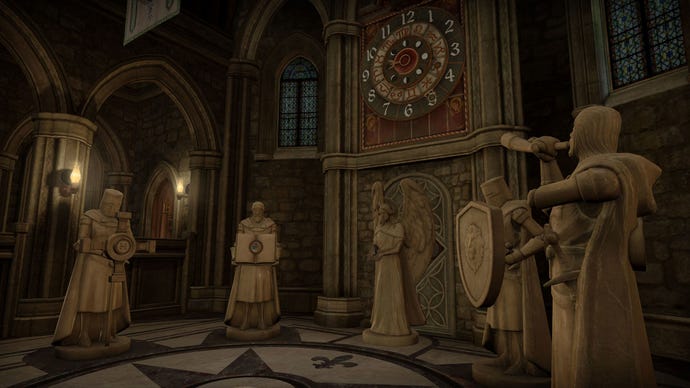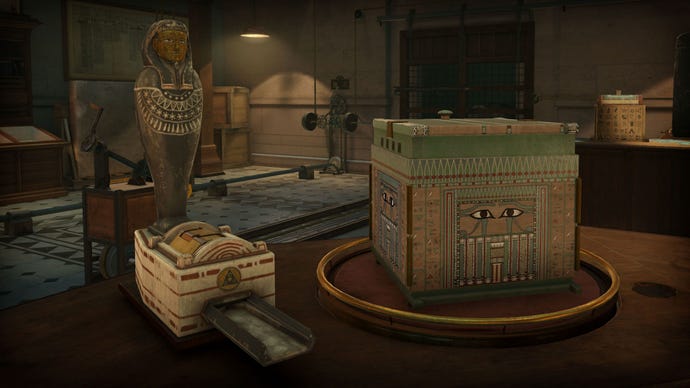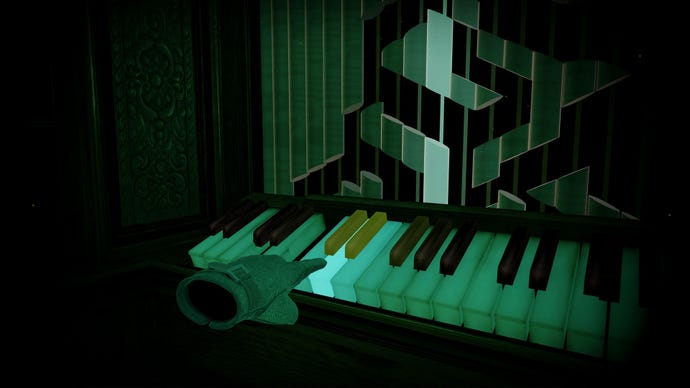Look, I could justify this month’s Reality Bytes in any number of ways. I could say the VR launch cupboard is a little bare at the moment, with Steam’s New Releases list offering up a lot of dour military shooters, dubious Early Access projects, and fantasy dismemberment porn. I could say that The Room VR: A Dark Matter has just received a PSVR2 release, so now seems an opportune moment to revisit this acclaimed spin-off puzzler. I could say that The Room VR is the only entry in the series RPS hasn’t covered yet. But to be perfectly honest, I just fancied playing The Room VR. So there.
Oh all right, there was a slightly more specific reason why I wanted to revisit a game that came out just three days after Half-Life: Alyx. Upon its launch, there wasn’t much else like The Room on VR devices, a dedicated puzzler with high production values that didn’t feel the need to throw in a gun to shoot or a melon to chop. Now, there are bunch of fantastic VR brain-ticklers swimming in the pond, such as the time-travelling epic Wanderer, the perspective-bending A Fisherman’s Tale series, and the ingenious automation extravaganza The Last Clockwinder.
Hence I was curious to know how A Dark Matter squared up against these newer and arguably more inventive titles. Fireproof certainly know how to make a pacey, intriguing puzzle game, and their VR spin on the formula adds a few fun tricks of its own. That said, as a VR experience there are some irksome design choices that betray the studio’s unfamiliarity with the tech.
Taking place in 1908, The Room VR sees you play a police officer searching for an archaeology professor who has gone missing in the British Museum. Contacted by a stranger calling themselves The Craftsman, you’re whisked from your police station into several puzzling scenarios, each of which takes place in a different, lavishly designed location. The first of these occurs where your missing professor disappeared, an Ancient Egyptian exhibit at the British Museum. Here, you must unlock an array of elaborate mystery boxes, all to crack open a forbidding sarcophagus in the centre of the room.

VR games take varying approaches in how they let you explore environments, but the Room VR is particularly unique. It employs a teleport-based movement system, but you can only teleport to designated points in each area. This derives from, where viewpoints are also preset, likely for technical reasons in part, but also to help guide you through each puzzle. In VR, however, the inability to move around freely is much more limiting, especially given how lovingly detailed the game’s 3D environments are.
Of course, movement isn’t the main appeal of The Room VR. That would be getting hands on with all of its devious contraptions. In this, A Dark Matter does a fantastic job. It’s all gears and cranks and buttons and switches and levers and dials and pulleys and knobs and handles and oddly-shaped keys, with every pulled, pushed, turned or twisted gizmo revealing another layer of its magnificently designed puzzle boxes. I will say, though, that the game would benefit from stronger “grip” feedback, as sometimes it isn’t intuitive, and you’ll often have to look at your virtual hands to ensure they’re in the right spot to grab an object.
On top of this tactile tinkering are a couple of broader mechanical ideas. The game acknowledges the cumbersome box strapped your face in its own fiction, furnishing you with a nifty wearable “lens” that lets you peer beyond the mortal realm. In its most basic function, this lens reveals hidden neon writing covering the walls. It’s a neat trick, but I found myself distracted by the inelegance with which this vision mode is implemented. To activate the lens, you have to open up the inventory, and then manually pull a lever on the inventory menu. Worse, the lens automatically switches off every time you move through the world, which means you’re constantly having to reopen your inventory to switch it back on.

At first, the concept doesn’t really seem worth the fuss. Fortunately, it becomes more involved as the game progresses. You’ll quickly upgrade your lens to let you see through specific surfaces, enabling you to reach into the guts of certain devices to access hidden puzzles. Once you reach the game’s middle act, it upgrades again to let you physically enter the puzzles, crawling inside devices and wandering around their seemingly enormous mechanisms. This dramatic shift in scale is the kind of thing VR does really well, and while the impact of it in A Dark Matter is slightly lessened by a fade-to-black between areas, it remains impressive.
The best part of The Room VR, however, is also the most incongruous. After visiting two fairly grounded locations, A Dark Matter completely jumps the broomstick, transporting you to a fairytale witch’s hut complete with bubbling cauldron and crystal ball. Here, you solve puzzles by brewing potions, collecting ingredients and tossing them into the cauldron in exchange for items that unlock new areas in the hut.

It’s very silly, but also enormously fun, a real “let your hair down” moment even though the tone remains serious. The whole sequence operates on a different logical plain, swapping out hieroglyphs and clockwork contraptions for arcane symbols and phases of the moon. It also includes possibly the best key ever designed for a video game. I’d happily play a full game of this. Forget The Room, Crone Simulator is where it’s at.
That’s a joke, obviously. Fireproof Games should not, under any circumstances, forget The Room. The four flatscreen entries in the series are among the best puzzlers ever made, and A Dark Matter holds its own in creativity and goldilocks-zone challenge. Is it still the best VR puzzler around? Maybe not, and it remains fairly expensive almost three years on since launch. But it is a ton of fun, and not the worst place to start if you’re completely new to VR.
window.dispatchEvent(new Event('BrockmanFacebookPixelsEnabled'));
}
window.addEventListener('BrockmanTargetingCookiesAllowed', appendFacebookPixels);
